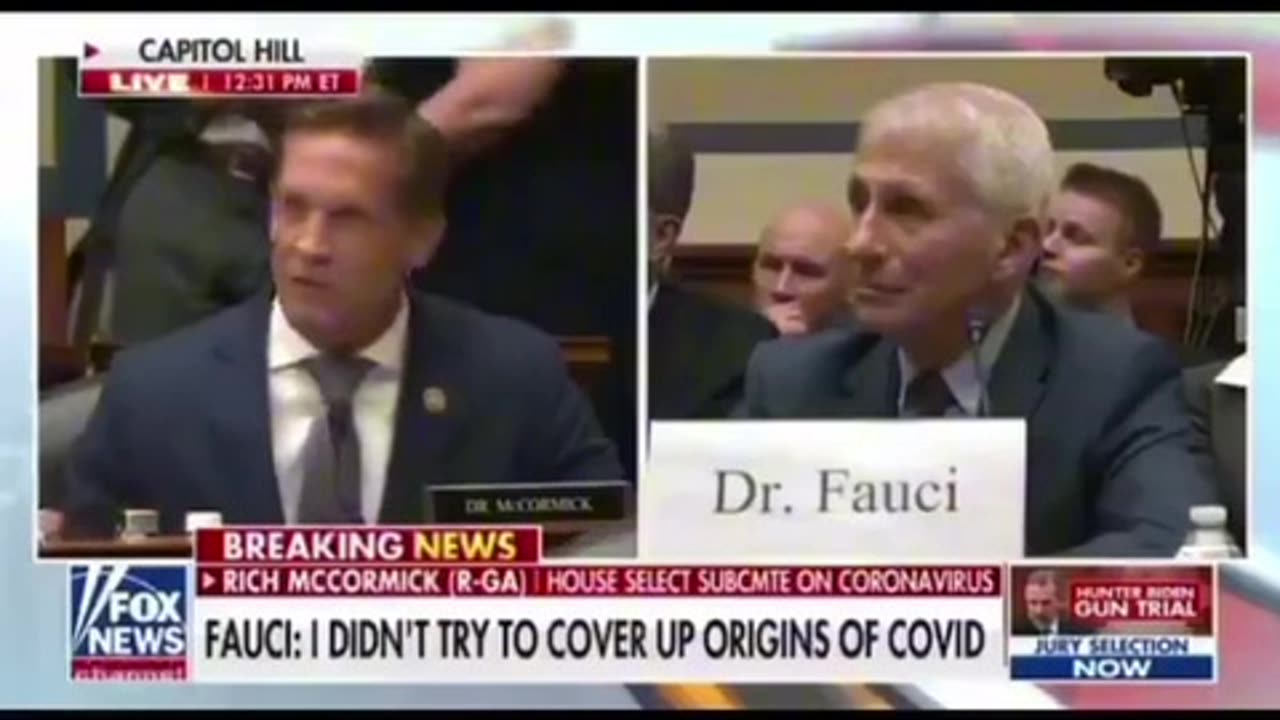Premium Only Content

The Unveiled Reality: The Implications of Leaked Fauci Audio on Public Trust and Individual Freedom
The recent leak of audio purportedly featuring Dr. Anthony Fauci has reignited fierce debate over the balance between public health policies and individual freedoms. The statements captured in this audio reveal an unapologetic strategy of leveraging societal pressure and legal empowerment to enforce vaccination compliance, sparking concerns about ethics, manipulation, and the erosion of public trust.
This revelation demands not just outrage but deep analysis. It raises critical questions about the methods used to implement public health initiatives, the broader consequences for democratic societies, and the potential long-term damage to the credibility of health institutions.
The Core Message of the Audio
The leaked audio outlines a clear strategy: institutions—ranging from schools and universities to major corporations—should enforce vaccine mandates by making life increasingly difficult for those who choose not to comply. The underlying rationale seems to be that people, when faced with overwhelming societal and professional obstacles, will abandon their resistance and comply with vaccination requirements.
While public health officials have long argued for the necessity of vaccinations in controlling pandemics, the tone and content of the leaked statements reflect a stark departure from persuasion through science and ethics. Instead, it reveals a coercive approach that prioritizes compliance over dialogue, stoking fears of authoritarian overreach.
Ethical Concerns: Public Health vs. Personal Freedom
1. Erosion of Bodily Autonomy:
• The idea of forcing compliance by making life unlivable for the unvaccinated raises fundamental ethical questions. Bodily autonomy—the right to make decisions about one’s own body—is a cornerstone of individual freedom and human rights. By undermining this principle, even for public health purposes, policymakers risk setting a dangerous precedent.
2. Manipulation Through Fear and Hardship:
• The approach of creating societal barriers as a means to coerce compliance shifts the focus from informed consent to forced submission. This erodes the foundational principle of trust between the public and health authorities, making future public health efforts more difficult to implement.
Impact on Trust in Public Institutions
1. The Trust Deficit:
• Over the past few years, public trust in health institutions has plummeted, fueled by perceived inconsistencies, lack of transparency, and authoritarian measures. The leaked audio exacerbates this deficit, confirming suspicions that public health policies were not solely driven by science but by political and corporate interests.
2. Damage to Credibility:
• When public officials adopt a coercive stance, it undermines the credibility of their messaging. This is particularly dangerous in a crisis, where trust in health authorities is essential for widespread compliance and cooperation.
The Role of Corporations and Institutions
1. Corporate Coercion:
• The audio highlights the role of corporations in enforcing vaccine mandates. While private companies have the legal right to set employment conditions, their participation in such strategies blurs the line between public health advocacy and corporate authoritarianism.
2. Educational Institutions:
• The idea of universities and schools denying access to education based on vaccination status raises profound ethical questions. Education is a fundamental right, and restricting access based on personal health decisions risks creating a society where basic rights are contingent upon compliance with state and corporate mandates.
The Bigger Picture: Society at a Crossroads
1. Fear as a Tool of Control:
• The use of fear and hardship as mechanisms for enforcing public health policies sets a troubling precedent. It normalizes a model of governance where control, rather than cooperation, becomes the default response to crises.
2. The Role of Public Dialogue:
• A healthy democracy thrives on open dialogue, debate, and mutual respect. The approach revealed in the leaked audio undermines these principles, replacing them with coercion and fearmongering.
A Path Forward: Restoring Trust and Ethical Governance
1. Rebuilding Public Trust:
• Transparency is key. Public health institutions must commit to open communication, sharing both successes and mistakes honestly. This approach fosters trust and encourages cooperation without resorting to coercion.
2. Balancing Rights and Responsibilities:
• While public health is a collective responsibility, it must be balanced with individual freedoms. Policies should prioritize education, accessibility, and voluntary compliance over mandates that alienate and disenfranchise large segments of society.
3. Accountability and Oversight:
• There must be mechanisms to hold public officials accountable for unethical or authoritarian policies. Without accountability, trust cannot be rebuilt, and the cycle of division and mistrust will continue.
Final Thoughts
The leaked Fauci audio is more than a scandal—it is a mirror reflecting the deeper fractures within our society. It highlights the tension between collective welfare and individual freedom, the growing distrust in public institutions, and the ethical dilemmas posed by crisis management.
The way forward requires courage: courage to question authority, to demand transparency, and to protect the principles of freedom and autonomy that define a democratic society. Only through such vigilance can we ensure that public health measures are rooted in ethics, trust, and the collective good—not coercion and fear.
-
 1:02
1:02
FragmentsOfTruth
4 hours agoPolarizing Podcast Debate: Politics, LGBTQ+ Rights, and Modern Masculinity
291 -
 22:01
22:01
DeVory Darkins
1 day ago $12.65 earnedHakeem Jeffries SHUTS DOWN The View as Matt Gaetz Speaks out
19.3K67 -
 2:02:54
2:02:54
Mally_Mouse
3 hours agoLet's Play!! - Spicy Saturday
9.93K -
 1:33:06
1:33:06
Slightly Offensive
4 hours ago $12.47 earnedAre You Ready for What's Coming Next? | Just Chatting Chill Stream
31.1K13 -
 32:10
32:10
MYLUNCHBREAK CHANNEL PAGE
1 day agoThe Gate of All Nations
73.9K38 -
 13:07
13:07
Sideserf Cake Studio
8 hours ago $0.69 earnedIS THIS THE MOST REALISTIC SUSHI CAKE EVER MADE?
16.1K1 -
 21:08
21:08
Clownfish TV
23 hours agoElon Musk Tells WotC to BURN IN HELL for Erasing Gary Gygax from DnD!
13.6K6 -
 48:22
48:22
PMG
4 hours ago $2.49 earned"IRS Whistleblowers Speak Out on Biden Family with Mel K In-Studio"
11.2K3 -
 2:59
2:59
BIG NEM
6 hours agoLost in the Wrong Hood: Who Do I Check In With?
8.69K1 -
 1:29:32
1:29:32
I_Came_With_Fire_Podcast
16 hours ago"UFOs, Nukes, & Secrecy: Bob Salas on the 1967 Malmstrom Incident, UAPs, & Disclosure"
124K23